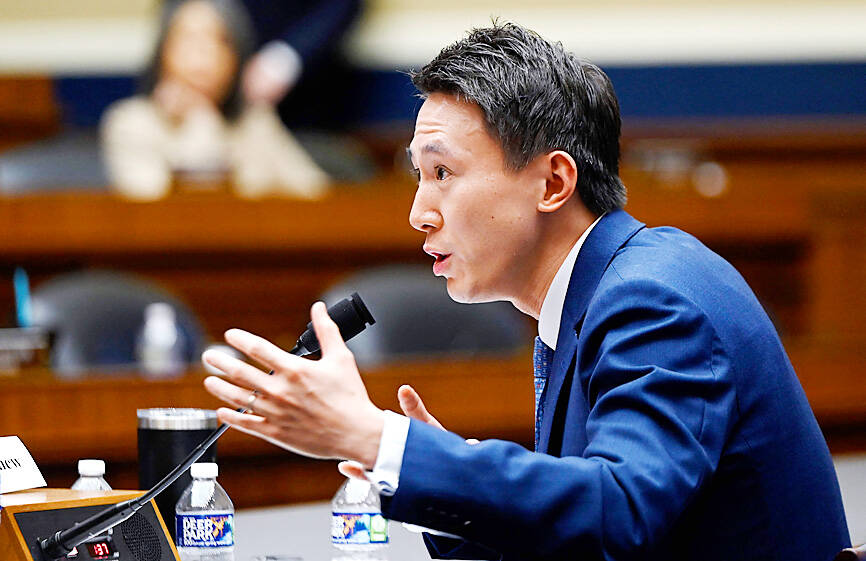TikTok chief executive officer Shou Chew (周受資), confronted with an unforgiving, distrustful US Congress, tried to give answers in his testimony on Thursday that avoided offending either the US government or China.
However, his evasiveness left Congress unsatisfied, with representatives hungrier than ever to punish TikTok for ties to its parent company ByteDance Ltd (字節跳動), based in Beijing. He did not bring his company any closer to a resolution.
Politically, TikTok is in a tougher spot. Its executives had been discussing divesting from ByteDance to resolve US national security concerns, people familiar with the matter told Bloomberg.

Photo: AFP
However, China this week said that it would firmly oppose a forced sale.
The US has to decide whether to restrict TikTok, which would be politically unpopular, or accept TikTok’s promises that its US data is safely guarded and that its US users would not be manipulated by the Chinese Communist Party — something many members of Congress have said they would have a hard time believing.
Chew did not say anything to alleviate concerns about sensitive TikTok data eventually reaching the Chinese government, CFRA Research senior equity analyst Angelo Zino said.
That could leave TikTok in limbo among the legislature — heavily criticized, but not yet banned — and increase pressure on national security officials and US President Joe Biden’s Administration to come to a resolution.
Legislators and regulators have two main areas of concern, which were on display on Thursday: whether TikTok’s ownership by a Chinese tech company presents national security risks and how users — especially young ones — could be influenced by the videos they see on the app.
Lawmakers have already introduced four bills that aim to ban the app over the national security risks posed by its Chinese ownership, one of which has support from the White House.
However, there is only a 35 percent to 45 percent chance a ban would happen, “with 2024 being an election year and politicians needing to tread carefully to ban a platform that is extremely popular,” Zino said.
Chew fruitlessly tried to broaden the conversation to be about all social media companies — not just TikTok. He said that he supports comprehensive data legislation, saying that US social media companies “don’t have a great track record” on privacy, and that dangerous content for kids is an industrywide issue.
However, lawmakers did not buy Chew’s appeal.
Georgia Representative Buddy Carter summed it up neatly when Chew invoked “industrywide” arguments: “We’re talking about TikTok,” Carter said.
Chew declined to answer questions about whether he supports the US First Amendment, repeating that he was in Congress to answer questions about TikTok. He said the app supports “free expression” and that it has committed to promoting free speech.
“Does TikTok support genocide?” asked Republican August Pfluger of Texas, referring to the Uighur minority.
“No,” Chew said.
Behind Chew in the audience for the hearing sat multiple TikTok influencers, supporting the app’s presence in the US because of how critical it has become for their lives and work.
“I understand what the Congress people are arguing toward today, and certainly want to hear their perspectives and learn more about any potential dangers,” said Vitus Spehar, whose “UnderTheDeskNews” account has 3 million followers on TikTok. “But I think that my personal experience is, this is our community. This is where we’ve survived the pandemic together.”

The US dollar was trading at NT$29.7 at 10am today on the Taipei Foreign Exchange, as the New Taiwan dollar gained NT$1.364 from the previous close last week. The NT dollar continued to rise today, after surging 3.07 percent on Friday. After opening at NT$30.91, the NT dollar gained more than NT$1 in just 15 minutes, briefly passing the NT$30 mark. Before the US Department of the Treasury's semi-annual currency report came out, expectations that the NT dollar would keep rising were already building. The NT dollar on Friday closed at NT$31.064, up by NT$0.953 — a 3.07 percent single-day gain. Today,

‘SHORT TERM’: The local currency would likely remain strong in the near term, driven by anticipated US trade pressure, capital inflows and expectations of a US Fed rate cut The US dollar is expected to fall below NT$30 in the near term, as traders anticipate increased pressure from Washington for Taiwan to allow the New Taiwan dollar to appreciate, Cathay United Bank (國泰世華銀行) chief economist Lin Chi-chao (林啟超) said. Following a sharp drop in the greenback against the NT dollar on Friday, Lin told the Central News Agency that the local currency is likely to remain strong in the short term, driven in part by market psychology surrounding anticipated US policy pressure. On Friday, the US dollar fell NT$0.953, or 3.07 percent, closing at NT$31.064 — its lowest level since Jan.

The New Taiwan dollar and Taiwanese stocks surged on signs that trade tensions between the world’s top two economies might start easing and as US tech earnings boosted the outlook of the nation’s semiconductor exports. The NT dollar strengthened as much as 3.8 percent versus the US dollar to 30.815, the biggest intraday gain since January 2011, closing at NT$31.064. The benchmark TAIEX jumped 2.73 percent to outperform the region’s equity gauges. Outlook for global trade improved after China said it is assessing possible trade talks with the US, providing a boost for the nation’s currency and shares. As the NT dollar

The Financial Supervisory Commission (FSC) yesterday met with some of the nation’s largest insurance companies as a skyrocketing New Taiwan dollar piles pressure on their hundreds of billions of dollars in US bond investments. The commission has asked some life insurance firms, among the biggest Asian holders of US debt, to discuss how the rapidly strengthening NT dollar has impacted their operations, people familiar with the matter said. The meeting took place as the NT dollar jumped as much as 5 percent yesterday, its biggest intraday gain in more than three decades. The local currency surged as exporters rushed to